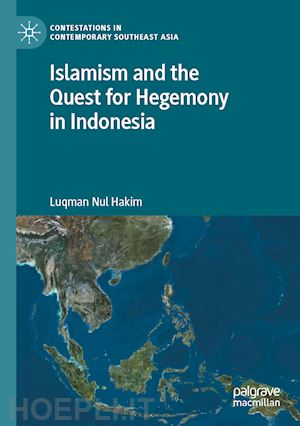

Questo prodotto usufruisce delle SPEDIZIONI GRATIS
selezionando l'opzione Corriere Veloce in fase di ordine.
Pagabile anche con Carta della cultura giovani e del merito, 18App Bonus Cultura e Carta del Docente
This book examines the failure of Islamic politics in becoming a hegemonic force in Indonesia and the far-reaching consequences for current practices of democracy and of Islam itself. In contrast to the thesis of compatibility between Islam and democracy following the dominant discourse of the Global War on Terror (GWOT) and neoliberal democracy, this study situates Islamic politics in broader social settings by examining its nature and trajectories throughout Indonesia’s modern political history. The book thus investigates how the practices of Islamic politics, or Islamism, have shaped and been transformed through political contestations and the formation of coalitions of multiple forces in constructing Indonesia’s socio-political landscape.
Using the concept of hegemony from poststructuralist discourse theory, the analytical framework applied in this book goes beyond liberal epistemologies of Islamism that prescribe the separation of religion from politics and treat Islamism as an object of intervention. Instead, the book is premised on the contention that Indonesia is a political construction, in which Islam has become one of the major discourses that have defined and transformed Indonesia’s nation-state throughout history. In this view, it is argued that the nature and dynamics of Islamism are not driven primarily by different interpretations of religious doctrines, cultural norms or by the imperative of institutions. Rather, the struggles of different Islamist projects in their quest for hegemony are contingent on the outcomes of socio-political changes and contestations that involve multiple political forces, both within and beyond the Islamists, in specific historical conjunctures.
Chapter 1. Islamism in Indonesia: Setting the Stage.- Chapter 2. Islamism and the Politics of Hegemony.- Chapter 3. Islamism and the Making of Indonesia.- Chapter 4. New Order and the Politicisation of Islam.- Chapter 5. Islamism and Its Hegemonic Failure in Democratising Indonesia.- Chapter 6. Neoliberal Hegemony and the Populist Moments: Whither Islamism?.- Chapter 7. Conclusion.
Luqman Nul Hakim is a lecturer at the Department of International Relations and a director at the Institute of International Studies (IIS), Universitas Gadjah Mada, Indonesia.











Il sito utilizza cookie ed altri strumenti di tracciamento che raccolgono informazioni dal dispositivo dell’utente. Oltre ai cookie tecnici ed analitici aggregati, strettamente necessari per il funzionamento di questo sito web, previo consenso dell’utente possono essere installati cookie di profilazione e marketing e cookie dei social media. Cliccando su “Accetto tutti i cookie” saranno attivate tutte le categorie di cookie. Per accettare solo deterninate categorie di cookie, cliccare invece su “Impostazioni cookie”. Chiudendo il banner o continuando a navigare saranno installati solo cookie tecnici. Per maggiori dettagli, consultare la Cookie Policy.